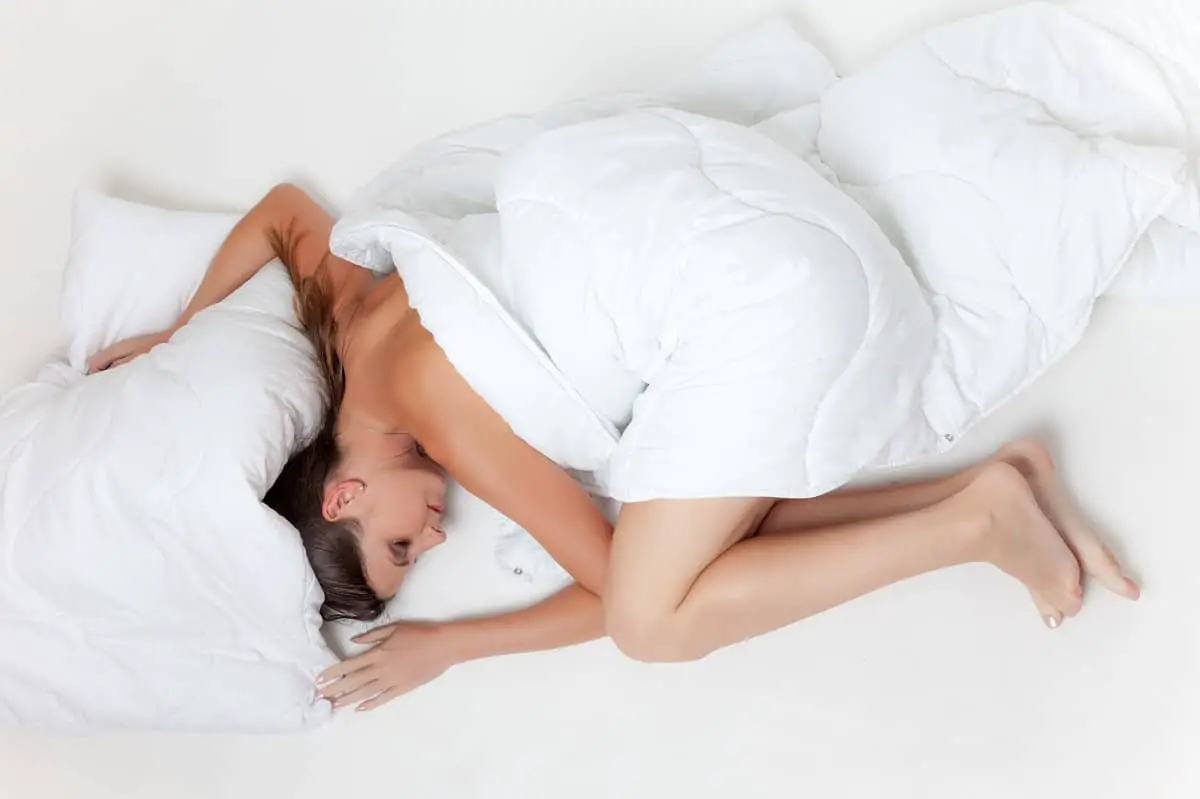Whether it’s from your job, a major life event such as a wedding, a family crisis or personal problems, stress can seriously affect your sleep. As stress hormones course through your body, your heart rate increases, blood pressure goes up and energy levels spike.
This is hardly a recipe for deep relaxing sleep.
And it gets worse if you don’t do something about it. It begins with high stress levels and then sleep deprivation soon after because you are not getting enough sleep. From there, these two feed into each other, creating a worsening cycle that is not only bad for your productivity during the day but also dangerous for your health.

There is clear research that elevated stress levels – caused partly by stressful circumstances and partly by the resulting sleep deprivation – contribute to obesity, heart disease and even dementia.
So you need to try your best to manage your anxiety and stress and get a good night’s sleep. It’s important for your health, your productivity and your sanity. We have a few science-backed tips that can help.
First, Make Sure It’s Not Depression
Oftentimes, symptoms of prolonged stress and depression can overlap. It’s important that you differentiate between the two.
If it’s stress, it’s easier to deal with it yourself by making a few lifestyle changes. If it’s depression, you'll need professional help. The same strategies you use to quickly ward off stress may not work with depression.
Symptoms associated with depression are often much more intense. While you may just have trouble sleeping when stressed, you could find yourself contemplating suicide when depressed. While you might feel a bit down and anxious when stressed, depression causes powerful mood changes. You may feel a deep inescapable feeling of melancholy.
See more differences between the two here.
Also make sure you don’t have an anxiety disorder, which is also serious and requires professional help.
If you are sure it's just a bout of stress, let’s get you sleeping again.
Note: If the sleeplessness continues despite your best stress management efforts, see your doctor or therapist.
1. Try Some Exercise

Exercise is often referred to as a magic pill for a reason. It can work wonders in a lot of situations where you are struggling with your overall well being.
If you find yourself too stressed to get any shuteye, some exercise might help (that is if you already aren’t working out). It helps the body control cortisol levels thus reducing stress.
Exercise also helps you relax, especially if you do it in the afternoon or evening. As your body temperature goes back down and energy levels go back to normal, you are likely to sleep faster and better.
The best time for exercise is usually in the morning but you can also do it in the afternoon or evening. Just be careful not to do it too close to your bedtime as it can prevent you from falling asleep.
You don’t have to torture yourself with intensive exercise especially if you are not used to working out. Even a brisk 30-minute walk after work can make a big difference.
Do something that you enjoy. It can be cycling, running, dancing, rowing or anything that gets your heart pumping and wears you out.
2. Find a Better Evening Routine

Your sleep time doesn’t start when you slip under the covers; it begins a couple or so hours before.
Your body and mind needs time to prepare to sleep. If you don’t give it time, your stress levels will remain high and you’ll be unable to relax enough to fall asleep.
Change how you spend your evening and you will sleep better.
Evening habits that can elevate stress
- Reading emails.
- Watching/reading news.
- Drinking coffee
- Eating/drinking sugary foods and beverages. Increased blood sugar increases stress.
- Using your smartphone or computer before bedtime.
- Drinking alcoholic drinks (alcohol is not a sleep aid).
Evening habits that can reduce stress (and help you sleep)
- Reading a book.
- Listening to music.
- Spending quality time with your family.
- Writing a diary/journal.
- Doing mental exercises (distracts you from stress and tires your mind)
- Drinking certain herbal teas such as chamomile, lavender and peppermint.
3. Try Meditation Before Going to Bed
Meditation is a great way to reduce stress and relax your mind and body. If you’ve never done it before, I strongly recommend using guided meditation. Try this one on YouTube, or this one.
You can also try some mindfulness meditation to help your mind shift focus away from what’s bothering you.
4. Keep Gadgets Away

According to the National Sleep Foundation, gadgets like smartphones and tablets suppress the sleep hormone, prevent your mind from relaxing and prevent you from sleeping through the night.
Don’t just leave your smartphone somewhere out of reach in your bedroom, leave it in another room altogether. Turn off notifications and rings to ensure it doesn’t wake you up or keep you awake as you try to sleep.
5. Don’t Obsess Over Sleep
Just like obsessing over sexual performance (performance anxiety) can cause psychological impotence, so can obsessing over sleep cause insomnia.
One of the common reasons people are unable to fall asleep is because they are stressed over their inability to fall asleep.
Use meditation or soft music to avoid obsessive thoughts. If you are unable to sleep, don’t stay there fretting that you won’t get enough sleep. Get up and do something relaxing like reading a book, folding laundry or writing until sleep comes.
6. Try Some Pillow Talk
If you sleep with your partner, you’d be surprised at how relaxing ‘just talking’ can be. Talk about anything – your day, the new pet, that cute loveseat you saw online or anything that comes to mind.
Even if you sleep late talking, you’ll find that you’ll fall asleep faster and sleep better. This is because talking reduces stress levels.
You can also call a friend on the phone or chat for an hour with your sibling before going to bed.
7. Finally, Sleep Comfortable

An awful mattress, noisy surroundings or a hot bedroom will just add to your stress and anxiety. Do what you can to make your sleep environment more comfortable.
If the mattress sags or gives you a sore neck, buy a new one. See our online mattress comparison guide to help you choose the best type of mattress for your needs.
Set the thermostat at a lower temperature (between 60F and 67F) or buy a portable air conditioner. Block any street or security lights from coming in by using heavy curtains and reduce noise levels in the house or use a white noise machine.
Affiliate Disclosure
Affiliate Disclosure: I may earn a small commission (at no cost to you) if you purchase a mattress after clicking a referral link or using a coupon code on this site. That said, all content and opinions on this site are my own and are NOT affected by these payments.
This site participates in the Amazon Services LLC Associates Program, an affiliate advertising program designed to provide a means for sites to earn advertising fees by advertising and linking to Amazon.com.
*Amazon and the Amazon logo are trademarks of Amazon.com, Inc, or its affiliates.

